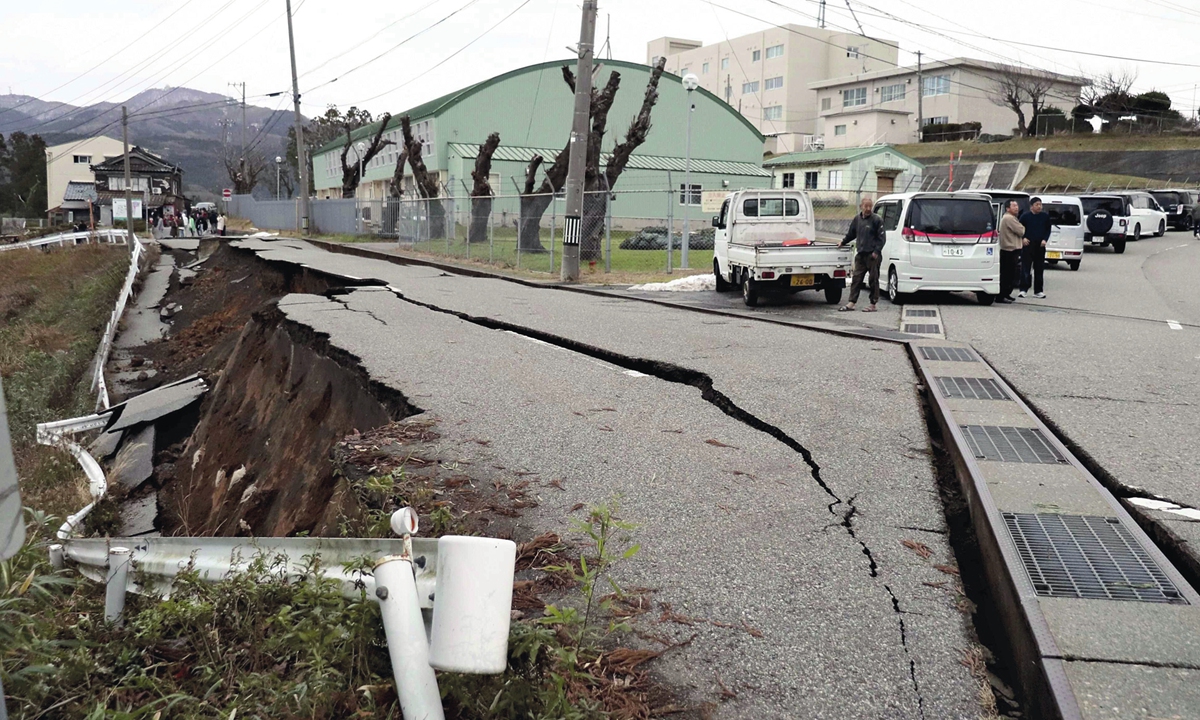Strong earthquake strikes Japan, triggering tsunami warnings

People stand next to large cracks in the pavement after evacuating into a street in the city of Wajima, Ishikawa prefecture, Japan on January 1, 2024, after a major 7.6 magnitude earthquake struck the Noto region in Ishikawa prefecture in the afternoon. Photo: AFP
A series of strong earthquakes with major ones of up to a preliminary 7.6 magnitude struck the western coast of central Japan on Monday, triggering tsunamis in the surrounding areas and countries. Currently, there are no reports of Chinese casualties, and China is not at risk of experiencing a tsunami, according to Chinese authorities.
According to the China Earthquake Networks Center, the earthquake occurred at 3:10 pm on Monday near the western coast of central Japan, at a depth of 30 kilometers.
The Global Times has learned from the Chinese Embassy in Japan that as of press time, there have been no reports of Chinese citizens being injured, and the embassy is actively collecting relevant information.
At the same time, the Embassy reminded Chinese nationals in Japan to be prepared for earthquakes and tsunamis, follow disaster prevention reminders, take emergency shelter, stay away from the coast, and ensure their personal safety.
In Ishikawa prefecture, which is closest to the epicenter, multiple roads and houses have been damaged, and some buildings have caught fire. At least two people have been injured as a result of this earthquake, according to local media. One elderly man was pronounced dead after a building collapse in Shika Town in Ishikawa, broadcaster NTV reported citing local police.
According to China Central Television (CCTV), approximately 32,500 households experienced power outages across Ishikawa prefecture, while about 90 households in neighboring Toyama Prefecture are also affected. The Shinkansen bullet train service has been temporarily suspended in some areas.
Earlier in the day, tsunami warnings were issued for a broad swath of the western coast, including Ishikawa, Fukui, Niigata, Toyama, Yamagata and other prefectures, following the strong earthquake. Ishikawa, where the epicenter of the major quake was located, observed tsunami waves of more than 1.2 meters at 4:21 pm local time, and Toyama prefecture reported tsunami waves of 50 centimeters at 4:23 pm local time, according to Xinhua. The Japan Meteorological Agency (JMA) has urged residents in the areas to evacuate immediately, according to Kyodo News.
It is the first time a major tsunami warning has been issued since the 2011 magnitude-9.0 earthquake and tsunami that devastated areas in northeastern Japan and triggered the Fukushima nuclear crisis, according to Kyodo News.
According to Xinhua, several areas in Russia's Far East issued tsunami warnings on Monday due to the impact of the earthquake in Japan. The east coast of South Korea also experienced a tsunami, which is expected to last for more than 24 hours.
However, it is expected that the Chinese coast will not be affected, said the Tsunami Advisory Center of China's Ministry of National Resources on Monday afternoon.
The earthquake quickly sparked widespread discussion on Chinese social media and made it to the trending list on China's X-like platform Weibo. Many netizens expressed their concern for Chinese people living in Japan, and hoped that this earthquake would not cause significant damage, especially after a recent earthquake in Northwest China's Gansu and Qinghai took more than 100 lives in December.
In addition to wishes and prayers, many netizens have also expressed concerns about whether this earthquake will impact the operation of nuclear power plants. According to NHK, the Japanese government has stated that there have been no reports of abnormalities in nuclear power plants following the strong earthquake.
Right after the earthquake, the Global Times conducted a video call with a Chinese national in Osaka surnamed Li, who said the earthquake was strongly felt in Osaka, with houses shaking, but no items were scattered. She felt the house shaking back and forth for about 10 seconds before it stopped.
A Chinese national in Tokyo surnamed Wang told the Global Times that the earthquake was clearly felt in the city center of Tokyo, but did not have a significant impact as Tokyo is far from the epicenter. "Currently, all television channels are broadcasting earthquake and tsunami-related information, and I am keeping an eye on it," he said.
Wang Shuda, a university student living in Kyoto, told the Global Times that he also felt a noticeable tremor in his apartment in the city center, but no damage was caused.
According to data from the Global Disaster Alert and Coordination System, approximately 30,000 people reside within a 100-kilometer radius of the epicenter. It is estimated that this earthquake and tsunami may cause significant impacts, the Global Times learned from the Ministry of Natural Resources.
The JMA also issued a warning to residents in earthquake-prone areas to be cautious of the possibility of another earthquake with a magnitude of around 7.0 occurring within the next week, particularly within the next two to three days.
